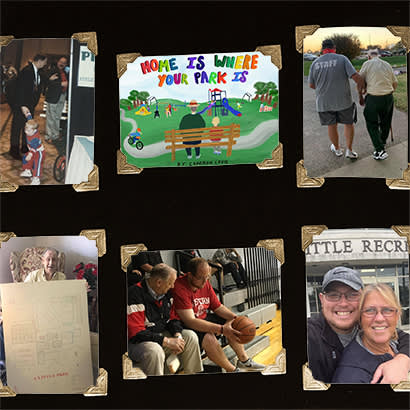
For an enhanced digital experience, read this story in the ezine.
In the world of parks and recreation, we all have individuals we look to as role models who set a path before us to follow as we strive to continue impacting communities in the same ways they have. For me, my greatest role model in this field also happens to be my grandpa, Dr. Alton Little. Parks and recreation are the very roots that our family tree grows from. So many of the ways I approach my job daily in the field are based on the lessons he taught me over the years. While starting his career as a park and recreation director at the age of 26 in the small town of Washington, North Carolina, in 1960, Dr. Little spent a majority of his career as a professor in recreation at Western Kentucky University (WKU), impacting the lives of thousands of students from 1971 to 2007.
I used to attend state and national conferences with my grandpa at a young age, running alongside him into the exhibit hall, so excited to see all the latest and greatest playgrounds on display. I was ready to test them all out, while he was ready to keep me distracted so he could work. Although a helpful distraction, he knew he was intentionally introducing me to my future passion and profession, parks and recreation. My grandpa passed away while I was attending the 2021 NRPA Annual Conference in Nashville. I find comfort in knowing that I was entering the exhibit hall at conference — a place where we spent countless joyful and fun-filled hours together — around the time he passed.
In one of his classes at WKU, my grandpa led students through a “park to scale” project. The assignment called for students to design their ideal park, complete with various amenities to be enjoyed by a community. Growing up, my mom, as one of his former students herself, had her project stored away in one of our closets. I used to sit in the house and stare amazed at the ballfields, playgrounds, trails, etc., and then draw my own park on lined notebook paper. I loved the idea that you could take a blank canvas and create a space for so many people to enjoy. It was during these moments as a child that my passion for parks and recreation started. My grandpa helped me to discover all the possibilities a park holds: a place for all people to live, learn and play together; a place where communities are built and memories are made; a place where everyone can feel loved, valued and accepted.
To continue sharing my grandpa’s inspiration with the world, I have decided to self-publish a children’s book, called Home is Where Your Park Is, dedicated to my grandpa and his legacy of service to others in parks and recreation. This is a story that I hope inspires children (and adults!) everywhere to use their imagination in dreaming up their own perfect park, in the same ways my grandpa inspired me. Home is Where Your Park Is has many different meanings for me, but it all started with my grandpa in eastern North Carolina. Every day, but especially right now, the park truly feels like home because it is where I feel closest to my grandpa.
What does it mean to leave a legacy? I believe one way to define legacy is leaving a place better than you found it. What seems like such a tall task can be easily accomplished in the day-to-day ways in which we love, serve and interact with those around us. A man who wore many hats had many different names — whether you knew him as Dr. Little, Brother Little or grandpa, one thing was consistent: you knew how much he cared for you. My grandpa lived a life of genuine love and service to others, truly harnessing the power parks, recreation and sports have to impact communities all over the world.
Cameron Levis, CPRE, AFO, CARSS I, is Special Populations Instructor, Bowling Green Parks and Recreation.

